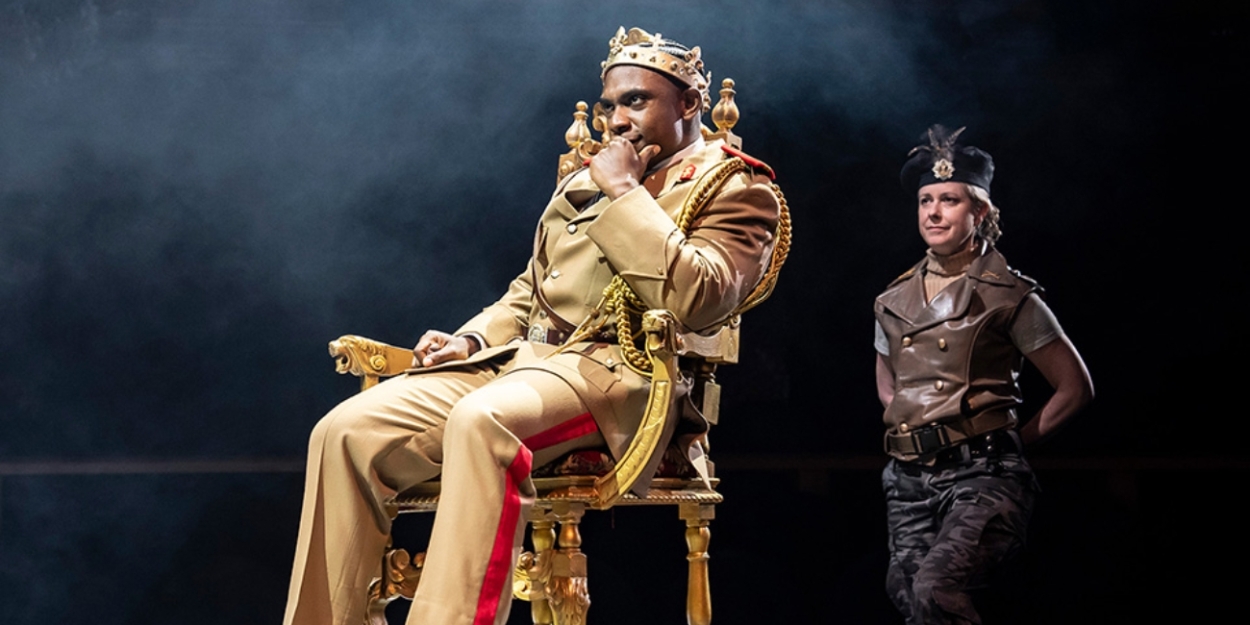Review: HENRY V at Chicago Shakespeare Theater
Shakespeare's most poetic and provocative war drama runs through October 6.

The Anglo-Irish political scientist Benedict Anderson once famously defined a nation as “an imagined political community” in which all citizens or residents have at least a vague sense of connection to all other citizens or residents. Anderson argues that one of the strongest influences on this sense of imagined connection is a given nation’s cultural products, works of art created and shared widely by its inhabitants that reflect the nation’s values. Perhaps it’s little surprise then that HENRY V, arguably William Shakespeare’s most nationalistic play—or at least his play most concerned with nationalism—opens with an appeal to the audience’s imagination. “Piece out our imperfections with your thoughts,” the Chorus beseeches, hoping that viewers will conjure up for themselves the horses and battlements someone would expect to find in one of history’s most famous war plays.
Now, as the United States faces the seemingly endless battlefield of an election year, HENRY V arrives at Chicago Shakespeare Theater under the thoughtful, often empathetic, direction of new artistic director Edward Hall. Featuring a strikingly charismatic yet grounded performance from its leading actor, HENRY V presents a compelling study of the excitement and danger inherent in even the best-intended feelings of nationalism, though the production occasionally lacks emotional depth outside of its title role. Performances run through October 6 at CST’s Courtyard Theater at Navy Pier.
Set in the middle of a century-long feud between England and France, HENRY V opens with two bishops fretting over an imminent tax on all property held by the Church. To avoid giving up their lands and savings, the two clergymen convince the newly-crowned King Henry (Elijah Jones) that he has a legitimate claim to the French throne and promise to provide any necessary support for the war effort. What follows is a stirring, if violent, epic detailing the unexpected victory of the English over the French at the Battle of Agincourt. But much of the play also concerns Henry’s private doubts as a leader and the crushing responsibility he feels for the men who fight in his name.
And what a leader the production has in Elijah Jones as the titular king. Taking up the crown with great gravity during the opening prologue, Jones soon settles into Henry’s youthful energy and boastfulness, establishing himself as a charismatic king adjusting to the demands of his elevated position. But it’s in the play’s second half, crouched in encampments and wandering quite literally in the fog of war, when Jones allows Henry’s full emotional complexity to flourish. It physically pains him to see his men fall in battle or suffer harsh punishments for their transgressions on the battlefield, pain which in turn fuels a rousing St. Crispin’s Day speech. But it’s a performance that Jones tinges ever so slightly with weariness as well since Henry knows the English face uncertain odds in the battle ahead. When the war is won, and Henry declares that God was with his men, Jones’s line delivery is filled with as much melancholy as relief, as though to ask if the victory was worth the cost.
Other noteworthy performances include Jaylon Muchison as a dryly humorous French ambassador; Scott Aiello and Demetrius Troy as the clowns Nym and Pistol, respectively; Rachel Crowl as the amusingly unshakable Welshman Fluellen; and Courtney Rikki Green as the endearingly (and hilariously) naïve Katherine, princess of France. But while all these roles provide a great deal of comedic relief, I wanted greater emotional depth in the performances, especially from the other soldiers. Part of the problem lies in Shakespeare’s won script; he was always more comfortable casting commoners as sources of comic relief rather than emotional complexity. But when Pistol mourns the sudden execution of a fellow soldier accused of robbery, viewers will have trouble feeling any similar sense of empathy for the condemned man.
More provocative are many of Hall’s directorial and creative choices, many of which may be familiar to audiences who saw Hall’s RICHARD III last spring but that are often used to even greater effect in this production. While the featured music in RICHARD sometimes felt disjointed or out-of-place, in HENRY, such choices more clearly tie to explorations of national culture and how this culture connects a nation’s subjects. Soccer chants blend with The Sex Pistol’s “Anarchy in the U.K.” to capture the, yes, anarchy of nationalistic fervor as soldiers prepare for war (music direction by Jon Trenchard). On the other hand, the most noticeable aspects of Michael Pavelka’s set design feel disappointingly similar to his creations used in RICHARD, only now the imposing scaffolding carries boxes of ammunition rather than instruments of torture.
Interestingly, some of the production’s most stunning moments of stagecraft are more reminiscent of moments from American military history than from the British. When the English first arrive at the coastal French city of Harfleur, they appear to do so in a Higgins Boat that might have landed at the beaches of Normandy on D-Day. One soldier repels from what may be a Black Hawk helicopter, and many other infantrymen trudge around the set in camouflage coverings viewers may have seen before at the Korean War Veterans Memorial in D.C. Such choices illustrate that Hall has a sincere reverence for the experiences of veterans across generations, a reverence that extends to CST’s community outreach efforts for this production as well.
While CST’s HENRY V may not satisfy audiences looking for a full-throated celebration of military might (all of the play’s central action occurs offstage), those patrons or elected officials seeking to better understand the doubts and trauma that plague veterans on and off the battlefield will leave the theater with a greater appreciation for what has been sacrificed in the name of our nation.
Reader Reviews
Videos

